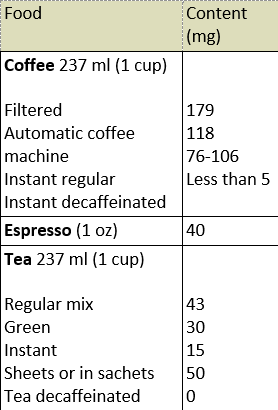
With the busy lives we lead, it is common to feel a lack of energy when you arrive at the gym. Studies have shown that caffeine could positively increase your performance in moderate to high intensity workouts.
What is the effect on the body?
During the day, a substance called adenosine naturally accumulates in our brain and sends a signal of fatigue to our body. Caffeine prevents adenosine from playing its role and reduces the feeling of fatigue. Extensive research on caffeine needs to be done to better understand the effect of caffeine on the body.
What is the impact on training?
Studies show that when we consume caffeine, our perception of effort and pain is reduced. In addition, it stimulates the central nervous system and improves our concentration. Our reaction time is improved as well as our contraction of muscle fibers. Caffeine can also have an impact on endurance training lasting more than 20 minutes and short duration (1 to 5 minutes). Contrary to some beliefs, caffeine, when consumed in moderation, does not dehydrate the body and does not affect the regulation of body temperature.
How much caffeine to see results?
We recommend 5 mg of caffeine per kg of body weight one hour or less before training.
- 55kg (121lb) – 275mg of caffeine
- 70kg (154lb) – 350mg of caffeine
- 95kg (209lb) – 475mg of caffeine
Some studies have even shown that a lower dose of 3mg per kg would be enough to have a positive impact on training.
How to measure caffeine?
In caffeine studies, caffeine tablets were consumed to accurately measure the doses. In everyday life, the amount of caffeine in beverages can vary. In general, here is the caffeine content in some beverages:

Source: Extenso.org
Recognizing the boundaries
Symptoms such as tremors, nervousness, nausea, gastro-intestinal discomfort, palpitations, fast breathing, headaches, insomnia, or irritability are all signs of over-consumption of caffeine. These symptoms will undeniably affect your training.Caffeine can help optimize your training performance. Keep in mind that each individual reacts differently with the same dose of caffeine. It is important to experiment and find the quantity that suits you best.
References
“Caféine.” Extenso, Université De Montreal, 17 Sept. 2012.
“La Caféine Améliore-t-Elle La Performance?” Coach, Association Canadienne Des Entraineurs.
Coté, Stephanie and Philippe Grand. Nutrition Sportive: 21 Jours De Menus. Modus Vivendi, 2015.
The impact of caffeine on performance is a post from Nautilus Plus. The Nautilus Plus blog aims to help people in their journey to fitness through articles on training, nutrition, motivation, exercise and healthy recipes.
Copyright © Nautilus Plus 2018

